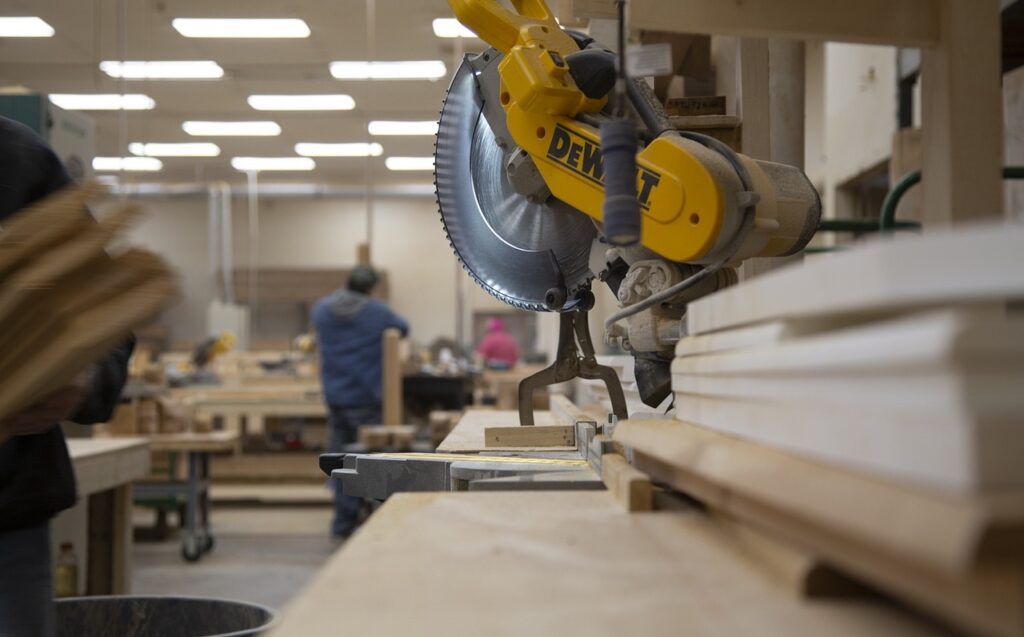Thailand has a thriving woodworking industry and has a well-developed woodworking machinery industry, with many local manufacturers producing a range of equipment and machinery for the domestic and export markets. The country also imports a significant amount of woodworking machinery to meet demand.
In 2020, Thailand imported USD 60.8 Million (7.2 times of export value) in woodworking machines. In 2021, Thailand imported USD 70.9 Million in Woodworking machines, becoming the 34th largest importer of Woodworking machines in the world. Thailand imports Woodworking machines primarily from: No. 1- China (USD 36.8 Million, 51.9% of total import ), No. 2- Taiwan USD 12.1 Million, 17% of total import), No. 3- Germany (USD 6.59 Million , 9.3% of total import ), No. 4-Japan (USD 5.04 Million, 7.11% of total import), and No. 5 – Malaysia ($2.09M, 2.94% of total import).
Many types of woodworking machinery are in demand in the country, both from domestic and overseas markets. Some of the most in-demand woodworking machinery in Thailand from overseas include:
- Computer Numerical Control (CNC) machines are highly sought after in Thailand’s woodworking industry due to their precision, speed, and versatility. Computer Numerical Control (CNC) machines are used for precision cutting, carving, and shaping of wood. The demand for CNC machines in Thailand is increasing due to the growing trend of automation in the woodworking industry.
- Edgebanders are machines used to apply a thin strip of material to the edges of wooden boards to give them a finished look. Edgebanders are in high demand in Thailand due to the increasing use of laminates and veneers in furniture production.
- Wide belt sanders: Wide belt sanders are used for smoothing and finishing wooden surfaces. They are often used in industrial settings, such as furniture factories and woodworking shops. Wide belt sanders are in high demand in Thailand due to the increasing demand for high-quality finished wood products.
- Surface sanding machines: Surface sanding machines are used to smooth and polish wood surfaces. They are commonly used in woodworking, carpentry, and DIY projects. They are widely used in Thailand’s woodworking industry for finishing products such as flooring, furniture, and decorative items.
- Sawing machines: Sawing machines, including circular saws, band saws, and panel saws, are in high demand in Thailand due to the increasing popularity of plywood and other engineered wood products. These machines are used in various stages of the woodworking process, from sawmilling to manufacturing finished products.
- Drying machines: Drying machines are used to dry raw timber to the optimal moisture level for woodworking. These machines are in demand in Thailand’s sawmilling industry, which processes both hardwood and softwood products.
- Woodworking lathes: Woodworking lathes are used for turning wooden pieces to create intricate designs and shapes. Woodworking lathes are in high demand in Thailand due to the popularity of traditional Thai wood carving.
Overall, the demand for woodworking machinery in Thailand from overseas is driven by the country’s growing woodworking industry, which produces a wide range of products for domestic and export markets.

In terms of woodworking machinery exports, Thailand is a major exporter of woodworking products and furniture, but the value of exports of woodworking machinery itself may be relatively small compared to other products. According to data from the United Nations, the value of woodworking machinery exports from Thailand was around USD 6 million in 2020.
No. of sawmill companies in Thailand
Thailand has a well-established sawmill industry, with many local companies engaged in the production of lumber and other wood products. The industry is a significant contributor to the country’s economy and provides employment opportunities for many people.
The number of sawmills in Thailand may vary, as there are many small and medium-sized operations as well as larger industrial sawmills. According to data from the Food and Agriculture Organization of the United Nations, there were around 5,000 sawmills in Thailand in 2020, but this figure may not reflect the total number of sawmills operating in the country.
In terms of the size of the sawmill market in Thailand, this may depend on a range of factors, including the demand for lumber and other wood products, the availability of timber resources, and competition from other wood-producing countries. The sawmill industry in Thailand may also be affected by environmental regulations and sustainability concerns, as well as fluctuations in the global market for wood products.
There were around 1,000 hardwood companies operating in Thailand. Thailand’s forestry industry is dominated by hardwood species such as teak, rosewood, and mahogany, which are highly valued for their beauty, durability, and strength. Hardwoods are widely used in Thailand for a variety of applications, particularly in high-end furniture making, decorative woodwork, and
construction. Some of the specific uses of hardwoods in Thailand include:
- Furniture making: Hardwoods such as teak, rosewood, mahogany and ebony are highly valued for their beauty, durability, and resistance to pests and rot. They are often used in the production of high-end furniture and decorative woodwork.
- Construction: Hardwoods are used in construction for items such as flooring, decking, and structural beams. Teak, in particular, is valued for its durability and resistance to moisture, making it a popular choice for outdoor applications.
- Musical instruments: Hardwoods are used in the production of musical instruments such as guitars and pianos due to their acoustic properties.
- Artwork: Hardwoods are commonly used in carving and sculpture, as well as in the production of decorative items such as picture frames and ornaments.
- Boat building: Hardwoods such as teak and mahogany are highly valued for their water-resistant properties and are commonly used in boat building.
In addition to the companies, there are also numerous small and medium-sized enterprises involved in the hardwood industry, including sawmills, timber traders, and woodworking shops. These players are involved in various aspects of the hardwood supply chain, from harvesting and processing raw logs to manufacturing finished products.
Thailand’s softwood market is relatively smaller compared to the hardwood market, and there are fewer companies involved in the production and processing of softwood products. Nevertheless, softwoods are used in Thailand for a variety of purposes, including construction, furniture making, and paper production. Some of the specific uses of softwood in Thailand are:
- Furniture: Softwoods like rubberwood and pine are popular for furniture making due to their availability, affordability, and ease of working with. They are used for items such as tables, chairs,
and cabinets. - Construction: Softwoods such as pine and spruce are commonly used in construction for items such as framing, roof trusses, and decking.
- Packaging: Softwoods are used for making packaging materials such as crates, pallets, and boxes.
- Paper production: Softwoods are an important source of pulp for paper production in Thailand.
Overall, while both hardwood and softwood companies operate in Thailand, hardwood companies are more prevalent due to the country’s abundance of valuable hardwood species.
Thailand is a major exporter of furniture, and the country has a well-established furnituremanufacturing industry. According to the Department of International Trade Promotion of Thailand, the value of furniture & wooden products exports from Thailand was approximately USD 3.5 billion in 2020. The United States, Japan, and the European Union are the main markets for Thai furniture exports. At the same time, there is also a strong domestic demand for furniture in Thailand. A report by Ken Research estimated that the market size of the Thai furniture industry was around USD 3.8 billion in 2020, which includes both domestic sales and exports. The domestic market is driven by factors such as rising urbanization, increasing disposable incomes, and changing consumer lifestyles, among others. Overall, both the export market and domestic consumption of furniture in Thailand are significant, and the Thai furniture industry is an important contributor to the country’s economy. In Thailand, both hardwood and softwood are used to make furniture, and the type of wood used may vary depending on the specific product and market demand.
In terms of popularity, teak is a highly sought-after hardwood in the Thai furniture industry, both for domestic sales and export markets. This is due to its durability, strength, and resistance to weather and insects. However, other hardwoods such as rosewood and mahogany are also popular for high-end furniture items. While softwoods such as rubberwood, pine, and acacia are commonly used for more affordable furniture. In recent years, there has been a growing trend towards sustainable and eco-friendly furniture, which has led to an increased use of plantation-grown rubberwood in the Thai furniture industry. Rubberwood is a fast-growing and renewable source of wood, and its use helps to reduce pressure on natural forests.
Overall, the popularity of specific types of wood for furniture in Thailand’s domestic and export markets may vary depending on consumer preferences and market demand, as well as factors such as price, availability, and quality. According to data from the International Trade Centre (ITC), Thailand’s hardwood furniture exports were valued at approximately USD 2.2 billion in 2020. This is a significant increase from previous years, with exports valued at USD 1.5 billion in 2019 and USD 1.4 billion in 2018.
The country has a large and diverse industry, with many players operating at different levels of the industry. Many manufacturers and exporters produce high-quality products for global and local markets which includes manufacturers, exporters, distributors, and retailers, among others. However, here are some estimation based on available data and industry insights:
- Manufacturers: There are likely thousands, of hardwood furniture manufacturers operating in Thailand. These range from small-scale artisanal producers to large factories producing for export.
- Exporters: According to the Thai Furniture Industries Association, there are over 800 furniture exporters based in Thailand. It is not clear how many of these specifically focus on hardwood furniture, but it is likely a significant portion.
- Distributors: There are likely many distributors of hardwood furniture in Thailand, who purchase products from manufacturers and sell them to retailers or directly to consumers.
- Retailers: The number of hardwood furniture retailers in Thailand is difficult to estimate, but there are certainly many, ranging from small shops to large chains with multiple locations.
Overall, it is safe to say that the hardwood furniture market in Thailand is quite large and competitive, with many players operating at various levels of the supply chain. This is a testament to the country’s long history of woodworking and furniture craftsmanship, as well as its global reputation for producing high-quality products.
What are the conference / seminar topics that could interest TIWF’s attendees?
- New technology in woodworking machinery: This could include discussions on the latest advances in automated machinery, CNC equipment, and other technologies that can improve productivity, efficiency, and quality in woodworking operations.
- Sustainable forestry and wood sourcing practices: Thailand has made progress in promoting sustainable forestry practices, and topics related to responsible wood sourcing and certification could be of interest to industry professionals.
- Woodworking & Furniture Product design and innovation: As the woodworking industry in Thailand continues to grow and evolve, topics related to product design and innovation could be of interest, particularly with a focus on incorporating new materials, technology, and design concepts into the industry.
- International trade and export opportunities: Thailand is a major exporter of wood products, and discussions on trade agreements, export opportunities, and market trends could be of interest to industry professionals looking to expand their businesses internationally.
- Workforce training and development: Topics related to workforce training and development could be of interest, particularly for small and medium-sized businesses looking to improve their technical skills and expertise.
Overall, the conference/seminar topics could vary depending on the specific needs and interests of the woodworking industry in Thailand, but these topics could be a starting point for planning relevant and informative events
